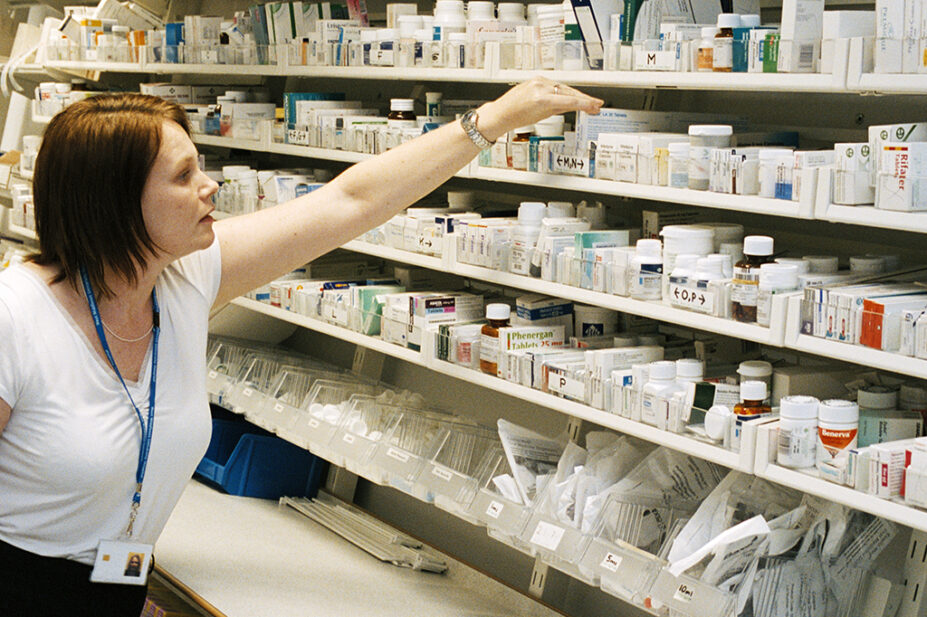
MARK THOMAS/SCIENCE PHOTO LIBRARY
“Constantly elevated medicines shortages” and medicine authorisations for products that are “typically slower” in Great Britain compared with EU member states has placed “a significant burden on pharmacists”, according to a report from health think tank The Nuffield Trust.
Using interviews and a roundtable event, which included pharmacists and representatives from the medicines industry, the report’s authors say that global medicine shortages are being felt “particularly acutely in the UK”, noting what it calls “a new normal of frequent disruption to crucial products”, which “worsened in 2023”.
‘The future for health after Brexit’ report, published on 18 April 2024, concludes that medicines shortages have been “exacerbated” by “companies removing the UK from their supply chains”, following the UK’s exit from the EU.
The report says the situation has been worsened since “medicine authorisations for products that the EU approves centrally are typically slower in Great Britain than they would be if it were still a member state”.
Data in the report show that, while four drugs authorised in the EU had been approved faster in Great Britain than in the EU between December 2022 and December 2023, 56 drugs had been approved later in Great Britain than the EU, and 8 EU-approved medicines had not been approved at all in Great Britain as of March 2024.
Data released by the Medicines and Healthcare products Regulatory Agency (MHRA) in March 2024 show that it had missed targets for approval of new medicines by more than 100 days in January 2024.
These data show that it took an average of 333 days for a regulatory decision to be made for a medicine under the national route for marketing authorisations, versus a statutory timescale of 210 days.
The Nuffield Trust report also notes that while the number of price concessions issued in England during the 4 years up to mid-2016 never exceeded 20 in a given month, it has been consistently significantly higher since then, peaking in late 2022 and remaining “highly elevated” ever since.
The report recommends that “UK government or professional bodies could survey community pharmacists or their representative groups to track their experience of shortages, as the Pharmaceutical Group of the European Union (PGEU) does at a basic level across the entire EU”.
It adds that this would “enable more monitoring of how well pharmacists understand reporting and response options, and what they see as the dynamics and drivers of problems”.
Commenting on the report, Janet Morrison, chief executive of Community Pharmacy England (CPE), said medicine shortages and market instability were “the worst that pharmacies have ever seen”, adding that in CPE’s polling of pharmacy owners, medicine supply issues consistently rank as “one of the top pressures” affecting pharmacies.
“The relationship between price concessions and shortages isn’t always straightforward, but it’s clear to us that both the medicine supply and reimbursement systems are at crisis point”, said Morrison.
“Pharmacy teams are spending hours trying to source medicines, and pharmacies now often end up supplying medicines at a financial loss, significantly impacting their bottom line and destabilising the pharmacy sector, with many pharmacies on the brink of closure.”
James Davies director for England at the Royal Pharmaceutical Society (RPS), said the report was “right to call for better data sharing on medicine shortages, as other countries have more transparent, publicly available data”.
“A lack of clarity on why a medicine is in shortage and when it is likely to return are huge issues for patients, who are naturally anxious about getting the treatments they need,” he added.
The RPS has launched a project to examine the causes of medicines shortages and help tackle their impact on patients and pharmacy practice.
A spokesperson for the Department of Health and Care said: “Concessionary prices can arise for various reasons and cannot be linked to shortages.
“Our priority is to ensure patients continue to get the treatments they need. There are around 14,000 licensed medicines and the overwhelming majority are in good supply.”


